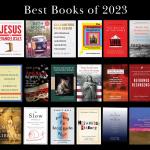As the calendar turns to another year, commercials and advertisements and media all yell loudly at us to make resolutions– to become healthier and fitter (remember the infamous commercial for a certain exercise machine from a few years back?), to make wiser financial choices, to set and accomplish big goals. In short, as each new year begins, culture tells us to do better and to be better. As Christians, we are certainly called to pursue sanctification and to continually grow in holiness. But I don’t think that being fitter or more important is what this call to holiness looks like!
My last post talked about the joy of the Incarnation, pointing us towards joy as a key theme of the season of Advent and of Christmas. What might living in light of this Incarnation, living in the aftermath of Christmas, look like for believers? How might that need to look different than the new year’s resolutions pushed at us by the world around us?
My husband (and colleague) Adam’s last post talked about using our church fathers and mothers as guides for devotional reading during the liturgical year, and today, I’ll be pointing us towards another figure from the first thousand years of church history to help us think about this question.
Dhuoda was a medieval Frankish noblewoman living sometime in the 800s; we don’t know enough about her life to give her exact date of birth (something that’s not uncommon for people who lived during this time period, especially for women). We do know that she was married in June of 824 to Bernhard of Septimania, Charlemagne’s cousin, and that she had two sons between then and 841. Her marriage does not seem to have been a particularly harmonious one, since her husband sent both of her sons away from her for his political gain, leaving Dhuoda alone and unable to raise them as she hoped. In fact, she didn’t even know her second son’s name, as her husband sent him away before his baptism. It’s because of these tragic circumstances that we have a glimpse into Dhuoda’s faith and practice, in the only surviving text in a Carolingian woman’s own words. During Advent of 841, she wrote the Liber Manualis, a Manual for her eldest son, William, intended to teach him all the things she would instruct him in if they could be together, ranging from the Trinity to bad habits to avoid.
From the beginning of the text, it is clear that Dhuoda has a firm understanding of what the Incarnation means for her, giving a beautiful description of God’s love for her and for her son:
To be sure, if the heavens and the earth were spread through the air like a parchment, and if all the various gulfs of the sea were transformed into ink, and if all the inhabitants of the earth born into this world from the beginning of humankind up to now were scribes, which is an impossible thing contrary to nature, they would not be able to comprehend (in writing) the greatness, the breadth, the height, the sublimity, the profundity of the Almighty or tell the divinity, wisdom, piety, and clemency of Him Who is called God. (Dhuoda, Manual, in Amy Oden’s In Her Words, p. 95)
A bit later on in the Manual, Dhuoda connects the love of God directly to the events of Christmas: “For the sake of his lesser ones, He deigned to reveal His presence here below, for, as the Fathers say, although He was the Supreme Creator of all, He was willing to take on the form of a slave” (Dhuoda, Manual, in Oden, p. 96). Out of this beautiful description of God’s vast love for humanity, reflected clearly in His coming in the Incarnation, Dhuoda admonishes her son to take action: to live in a way that reflects these theological truths and to shape his thoughts, deeds, and ambitions around them.
The initial actions Dhuoda asks William to take are to ground himself in these theological truths and to align his emotions and priorities accordingly: “I beg you to fear Him and to love Him with all your heart, all your mind, all your understanding, to bless Him in all your ways and deeds and to sing ‘For He is good, for His mercy endureth forever!’ And believe Him to be above, below, inside, and outside, for He is superior, inferior, interior, and exterior.” (Dhuoda, Manual, in Oden, p. 95) How is he to do this? Partially through “the acquisition of many books, in which you may understand and learn something greater and better than is written here concerning God, your Creator, through the teaching of the most blessed doctors.” (Dhuoda, Manual, in Oden, p. 95). As someone who spends a lot of time studying past discussions of God and who also acquires a lot of books, I find this admonition to be a good one!
It’s worth noting, though, that as Dhuoda moves through her manual, her admonitions become ever more practical. Pray often and clearly, work to make amends quickly when you wrong someone, love all (both the powerful and the powerless), work justice, speak the truth, do not be deceitful, do not do evil to your neighbor, do not take bribes against the innocent, patiently tolerate injury, be pure in heart and chaste in body, help the poor as often as you can, and (dauntingly) be “innocent in hands”- in short, be perfect, in emulation of Christ. For Dhuoda, living in light of the Incarnation means working to bring about justice and love on earth. It means learning more about who God is through diligent study and through the growth of one’s own faith, and then putting that knowledge of God into practice in working to become less: to serve the least of these and to love our neighbors.
In my opinion, these are the sorts of New Year’s resolutions we should be making as Christians, and there’s something really beautiful about sharing those resolutions with a mother from over a thousand years ago, seeking to raise her son well. As we enter into the New Year, let us likewise live in light of Christmas: let us learn more about who God is, love God with our hearts and minds, and love our neighbors through working for justice, making amends for wrongs, speaking the truth, and seeking to model Christ’s love for the least of these. And, of course, let us not neglect to collect good books.













